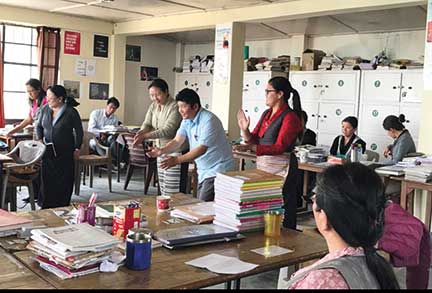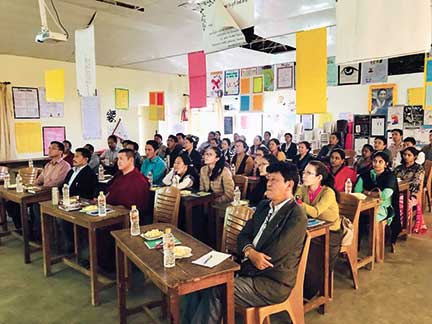Tenzin Dhargyal
The most valuable resource that all teachers have is each other. Without collaboration our growth is limited to our own perspective – Robert John Meehan
Teacher Professional Development (TPD) programmes are taken up by teachers to upgrade their content knowledge and pedagogical skills. Through these programs teachers validate the fact that they are learners first. The term TPD is not alien to Tibetan teachers because the practice has been present for a long time though not as systematic and guided like the present one which came into being courtesy the Department of Education, Central Tibetan Administration (CTA) through a series of surveys, discussions and workshops.
Since its beginning, this program has been faring comparatively well in almost all Tibetan schools. This program has been one of the many priorities of the Department of Education, CTA. As such Tibetan Children’s Village (TCV) schools also had taken their share in the call of duty and straightaway appointed a special TPD officer, whose sole responsibility was to offer support and guidance for the TCV teachers in TPD programmes.
 This year, teachers in the village schools have their weekly professional development common periods following the recommendation of the Educational Development Committee (EDC) meeting. As part of their collaborative practice, the members in the subject department meet up at different venues and address issues requiring immediate action or concern. Thus, they have freedom over the choice of their activities, which is the cornerstone of any professional development programmes. The teachers are the ones who are actually dealing with the students and as such they know exactly what professional development they need.
This year, teachers in the village schools have their weekly professional development common periods following the recommendation of the Educational Development Committee (EDC) meeting. As part of their collaborative practice, the members in the subject department meet up at different venues and address issues requiring immediate action or concern. Thus, they have freedom over the choice of their activities, which is the cornerstone of any professional development programmes. The teachers are the ones who are actually dealing with the students and as such they know exactly what professional development they need.
Lesson Study Group: This is a teacher collaborative practice replicated from Japan whereby a group of teachers work together to improve the quality of teaching and learning. Here in our schools, a group of teachers teaching the same subject and grade have their first meeting during their TPD period. First, they choose a difficult topic or chapter and together they share their expertise and discuss on how to make it easy for the students. Next, they make one lesson plan together choosing a suitable introduction, activity, assessment etc. After that, one of the teachers in the group teaches based on the lesson plan they have written. During the teaching, the rest of the teachers in this group observe the teacher and take down notes. They also observe the reactions from the students. After the lesson, it is time for feedback. At the next meeting, they change the previous lesson plan and write another, incorporating the feedback and suggestions. Once again, another teacher teaches and the rest observe. After the lesson, once again they meet and discuss. This is one complete lesson study cycle. First, make a lesson plan; then execute the lesson plan; collect the feedback and edit the lesson plan; finally execute the new lesson plan. In this manner, the cycle continues until the best lesson plan is evolved. The final lesson plan is shared with other schools. Lesson Sample: https://tpdsherig.wordpress.com/lower/
Peer teaching/Lesson observation: Two like-minded teachers form a pair. During their TPD period, they discuss their time-table and lessons. First, before the teaching, they will have pre-conferencing during which the teacher who is going to observe tells the other teacher what he/she is going to observe by giving the teacher some rubric. Then they go to one class. One teacher teaches and the other observes. After this, the teachers meet in staffroom for the debriefing. Before the other teacher gives her feedback, the teacher who has taught the lesson will talk about how the lesson went and what he/she missed. Then the teacher who observed the lesson shares his/her feedback. In the next round, they change their roles. This cycle; pre-conferencing, lesson demonstration; post-conferencing can be continued.
 Book discussion: A group of teachers form one group. They choose one book from a wide variety of pedagogy; child psychology, class management, learning theory, leadership etc. They read the book and share their opinion based on their experience taking ideas from the book they have chosen. One of the books chosen by our teachers was “What Did You Ask at School Today” by Kamala Mukunda. The teachers in small groups researched on various topics from the book. During the Teacher Professional Day, the group shared their presentation with their research based on this book. Here is the picture of a teacher sharing her group’s presentation on the book “Divaswapna”, which is related to teachers. It is uploaded here: https://www.slideshare.net/sherigoffice/book-reading-divasvapna-ths-mussoorie-2014?qid=f1dda723-482f-43f5-8cc4-f96380cc6c3b&v=&b=&from_search=2
Book discussion: A group of teachers form one group. They choose one book from a wide variety of pedagogy; child psychology, class management, learning theory, leadership etc. They read the book and share their opinion based on their experience taking ideas from the book they have chosen. One of the books chosen by our teachers was “What Did You Ask at School Today” by Kamala Mukunda. The teachers in small groups researched on various topics from the book. During the Teacher Professional Day, the group shared their presentation with their research based on this book. Here is the picture of a teacher sharing her group’s presentation on the book “Divaswapna”, which is related to teachers. It is uploaded here: https://www.slideshare.net/sherigoffice/book-reading-divasvapna-ths-mussoorie-2014?qid=f1dda723-482f-43f5-8cc4-f96380cc6c3b&v=&b=&from_search=2
Apart from the habitual lesson study groups, peer teaching and book discussions, these are some of the activities we have in our schools.
- Watching Youtube videos related to their subject or general teaching
- Sharing and discussing scholarly articles on subject or on teaching
- Inviting school counsellors to discuss child psychology or other relevant topics
- Inviting senior teachers or department heads for general sharing on the subject
- Sharing games, activities
- Having discussions on tests, standard, methodology, note making, textbook reading
- Simple activities like writing lesson plans together, checking books together
- Lesson demonstration voluntarily by members, volunteer peer observation
For such significant programmes and activities to happen effectively, both teachers and school heads have important roles to play. The teachers’ attitude towards the professional development programmes must be positive. School leaders, after taking into consideration the heavy workload of the teachers, should play the role of a facilitator and encourage the teachers in their programmes.
In a nutshell, the quality of education our students receive is directly connected to the effectiveness of the teacher professional development programs carried out in schools. And this effectiveness solely rests upon the attitude of the teachers and the regular support from the school heads.
The author is Teacher Professional Development Officer, TCV school, Dharamsala, Himachal Pradesh. He can be reached at tendar123@gmail.com.
